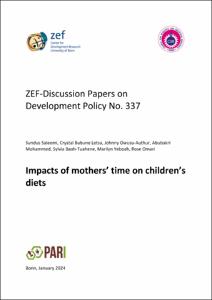Impacts of mothers’ time on children’s diets

Impacts of mothers’ time on children’s diets

| dc.contributor.author | Saleemi, Sundus | |
| dc.contributor.author | Bubune Letsa, Crystal | |
| dc.contributor.author | Owusu-Authur, Johnny | |
| dc.contributor.author | Mohammed, Abubakri | |
| dc.contributor.author | Baah-Tuahene, Sylvia | |
| dc.contributor.author | Yeboah, Marilyn | |
| dc.contributor.author | Omari, Rose | |
| dc.date.accessioned | 2024-02-14T14:47:12Z | |
| dc.date.available | 2024-02-14T14:47:12Z | |
| dc.date.issued | 01.2024 | |
| dc.identifier.uri | https://hdl.handle.net/20.500.11811/11319 | |
| dc.description.abstract | This paper provides insights into how variances in time spent by mothers in home production (i.e., domestic and care work) impact children’s diets. We test the hypothesis that a decrease in the time spent by mothers in home production negatively impacts children’s diets. Moreover, the paper considers whether substitute caregivers and improved water infrastructure can reduce these impacts. We use primary data from women traders in three markets in two regions in Ghana. Primary data collected from women traders includes women’s time use, the food consumed by children in the previous 24 hours, and the socio-economic and demographic characteristics of the traders’ households. To overcome the empirical challenge in estimating the relationship, we focus on the differences in the time spent by women traders in home production due to the differing demands on their time on “market” and “non-market” days. Market days are specified days for markets in a given geographic location. Market days are characterized by heightened trading activity, with more buyers and more competition. A comparison of the diets of traders’ children on market and non-market days allows for the attribution of effects to changes in the time spent by their mothers in home production while keeping other factors constant. The results suggest that children of women traders are significantly less likely to have achieved Minimum Meal Frequency (MMF) and Minimum Acceptable Diet (MAD) on market days compared to non-market days. This is accompanied by fewer hours spent by women in home production on market days. However, the paper also finds evidence that in certain scenarios the negative effect of demands on women traders’ time on children’s diets can be mitigated by substitute caregivers and the availability of water infrastructure. | en |
| dc.format.extent | 46 | |
| dc.language.iso | eng | |
| dc.relation.ispartofseries | ZEF Discussion Papers on Development Policy ; 337 | |
| dc.rights | In Copyright | |
| dc.rights.uri | http://rightsstatements.org/vocab/InC/1.0/ | |
| dc.subject | Africa | |
| dc.subject | Gender | |
| dc.subject | Food and nutrition security | |
| dc.subject | Marketing | |
| dc.subject | Agricultural production | |
| dc.subject.ddc | 330 Wirtschaft | |
| dc.subject.ddc | 370 Erziehung, Schul- und Bildungswesen | |
| dc.title | Impacts of mothers’ time on children’s diets | |
| dc.type | Arbeitspapier | |
| dc.publisher.name | Center for Development Research (ZEF) | |
| dc.publisher.location | Bonn | |
| dc.rights.accessRights | openAccess | |
| dc.relation.eissn | 1436-9931 | |
| dc.relation.doi | https://doi.org/10.2139/ssrn.4703635 | |
| ulbbn.pubtype | Zweitveröffentlichung |




